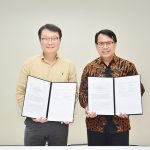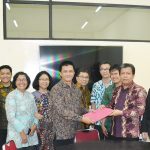The Department of Physics, Faculty of Mathematics and Natural Sciences Universitas Indonesia (FMIPA UI), has a big history and tradition in educations and researches since its early establishment from the decree of Ministry of Education and Cultural Affairs No. 108.094 December 21, 1960. In more than 5 decades, the Department of Physics has grown and developed because partnerships conducted with various parties. Accelerated developments of the Department of Physics was triggered by cooperation with National Nuclear Energy Agency (BATAN) in 1970 to prepare protection of radiation and nuclear instrumentation. This program had successfully created more than 200 graduates which mostly were employed at BATAN and other big institutions like Indonesian Institute of Sciences (LIPI) and also National Institute of Aeronautics and Space (LAPAN). In 1980, partnership was also conducted with Indonesian Agency for Meteorology, Climatology and Geophysics (BMG) to raise the qualification standards of its employees from High School Diploma to Bachelor of Science.
As a competition in private sector was going out of control, the Department of Physics realized the importance of up-to-date education corresponding to available jobs without sacrificing its quality and competence in creating great graduates. The Department of Physics was expected to create graduates able to fill formal sector such as universities and research institutions.
On the other hand, the Department of Physics needs to pay attention to human resources sector such as oil companies, telecommunication, electronics, hospital, etc. Therefore, the Department of Physics has been developing 6 specialty areas.
- Nuclear and Particle Physics: To produce graduates who are competent in quantitative analysis and prediction of phenomena of nuclear and elementary particles with computing capabilities and reliable programming.
- Materials Physics: To produce graduates who are competent in identification, modification, and manipulation of materials with a reliable practical experience and strong understanding of basic concepts of science
- Condensed Matters Physics: To produce graduates who are competent in modeling and theoretical calculations and/or synthesis, characterization and analysis of the electrical, magnetic and optical properties in crystalline, amorphous, or liquid systems
- Instrumentation Physics: To produce graduates who are competent in analyzing, duplicating, modifying, developing, designing, innovating and prototyping scientific instrumentation tools and industrial electronics.
- Geophysics: To produce graduates who are competent in the geophysical exploration (data acquisition, processing and data interpretation), which is based on strong basic concepts of geoscience, numerical computation and direct application in the field of oil and gas, geothermal, coal and minerals.
- Medical Physics and Biophysics: To produce graduates who are competent in the optimization of physics applications in the field of health such as relating to nuclear radiation, X-ray, ultrasound, resonance magnetic imaging and laser especially for diagnostic and oncology.






